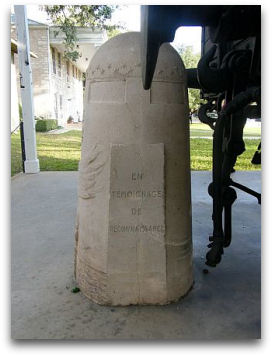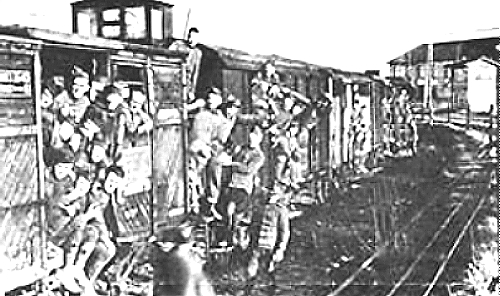
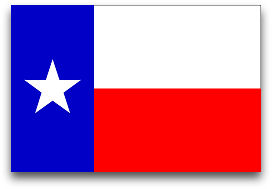
The Lone Star State
“On January 5, 1944, just 22 days after arrival in Africa, we were again ordered to prepare for movement. This time we boarded a train, unlike anything we had experienced before. It was a legendary 40&8 (40 men or 8 horses) train made up of small boxcars and a slow moving locomotive that strained every puff of smoke. While officers fared a bit better, Enlisted men were packed 30 to a car with full field equipment and rations for three days. Because of the crowded conditions, we slept, sitting up, in shifts, usually by leaning against the back of another G.I. for support. Our destination was Casablanca.”
Ed. Husted, historian
More: http://www.82ndengineers.org/82nd-ourhistory.htm
“You may all go to Hell, and I will go to Texas!”
“Be always sure you are right, then Go ahead.”
David “Davy” Crockett, pioneer and Texas hero after losing the 1835 race for Tennessee’s seat in the United States Legislature who died fighting at the Alamo along with more than a hundred other volunteers. http://medarus.org/NM/NMPersonnages/NM_10_02_Biog_Americans/nm_10_02_davy_crockett.htm
Annie Cordy French Ballade de Davy Crockett
https://www.youtube.com/watch?v=41GB9BHer5I
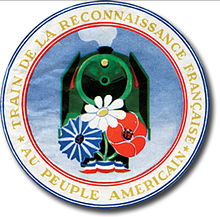
#GRATITUDE
#RESISTANCE
#MDFDEFriendshipMerciTrain70
© The Official French-American Project entirely conceived by Ms. Elisabeth JENSSEN to celebrate the 70th Anniversary of the Friendship Train and the Merci Train (2017- 2019). All rights reserved.
Chair, Elisabeth Jenssen
Honorary President: The Comte Gilbert de Pusy La Fayette
Contact: elisabeth.jenssen@francaisdeletranger.org
 Train de la Reconnaissance Française, Merci Train’s original logo (1949)
Train de la Reconnaissance Française, Merci Train’s original logo (1949)
Merci Train – Texas
La Societe des Quarante Hommes et Huit Chevaux
The Society of Forty Men and Eight Horses
Gifts of the Texas Merci Boxcar
Video: https://www.texasboxcar.org/boxcar-gifts.html
Featured Exhibit
Merci, Texas: A Story of Generosity and Gratitude
February 18 – December 31, 2017
Following World War II, Americans generously provided millions of dollars in relief supplies for battered Western Europe. To show their gratitude, French citizens sent more than 52,000 gifts packed in railcars, known as the Merci Train. Merci, Texas: A Story of Generosity and Gratitude explores this largely unknown story of American generosity and French gratitude. Visitors can learn about the Merci Train and view some of the presents included in the boxcar sent to Texas. The exhibit displays many unique items including original artwork, toys, a Louis XIV-style coat and a trumpet blown at the Arc de Triomphe.
http://www.tspb.texas.gov/prop/tcvc/cvc-exhibits/cvc-exhibits.html
Duty. Courage. Valor.
Texans Who Have Received The Medal Of Honor.
http://www.txmedalofhonor.com/#/
Merci Train brought thank-you gifts from France to Austin
Texas’ 40 & 8 boxcar is now displayed at the Texas Military Forces Museum.
By Michael Barnes – American-Statesman Staff
Posted: 12:00 a.m. Saturday, September 26, 2015
Reader Jill Wilkinson wonders what happened to the boxcar of thank-you gifts that the French people gave to Texas in 1949.
“Each state’s capital got one of the cars,” Wilkinson writes. “Austin’s car used to be under a roof outside the veterans building on the hill near MoPac (Loop 1) and Lake Austin boulevards. The plinth it was on is still there, but I think the railroad car has been moved to Camp Mabry. On the 50th anniversary of the end of the war, there was a small exhibit of some of the gifts at the Texas Memorial Museum. I am not sure where they have gone.”
Moments later, Jeffrey Hunt, director of the Texas Military Forces Museum at Camp Mabry, helps out.
“Why yes!” Hunt writes. “We have that ‘40 & 8’ Boxcar from the Gratitude — or Merci — Train that was designated for Texas inside the museum. The car was originally kept at Mabry when it first arrived, but was moved off-post to the American Legion Hall on Town Lake when the Korean War broke out and space was needed. It returned here and entered the museum in 2014. The 40 & 8 Society of the Legion has most of the gifts that were in the Texas boxcar.”
Some of the artifacts that came with the Texas boxcar in the Merci Train.
List of the Texas Merci Train Gifts currently on display at the Capitol:
Dress coat. Gift of unknown donor. Dolph Briscoe Center for American History, The University of Texas at Austin. This traditional men’s dress coat epitomizes French fashion during the 18th century.
Double edged sword, circa 1850. Gift of unknown donor. Dolph Briscoe Center for American History, The University of Texas at Austin. This military sword features a French eagle surrounded by six flags. French military officers usually had to provide their saber.
Brass military trumpet, circa 1910 and letter, 1948. Gift of Marcel Rispal, Paris. Dolph Briscoe Center for American History, The University of Texas at Austin. Marcel Rispal blew this trumpet at the Arc de Triomphe in Paris to celebrate Armistice Day (November 11, 1918) when the Allies declared victory in World War I. Rispal again blew the trumpet at the Arc following the liberation of Paris from Nazi Germany in August 1944.
Champagne bucket. Gift of unknown donor. Dolph Briscoe Center for American History, The University of Texas at Austin. This chromium (a high polish metal that resists tarnishing) bucket came from Bollinger, which began producing wine in 1829.
Bell from Reims Cathedral. Gift of Paul Herbin. Dolph Briscoe Center for American History, The University of Texas at Austin. Completed in 1311, Reims cathedral witnessed significant events such as Joan of Arc attending the coronation of Charles VII. During World War I, the cathedral was destroyed and Paul Herbin rescued this souvenir bell from the ruins.
Pen set and inkwell, circa 1940. Gift of Mr. and Mrs. Albert Bernard, Paris. Dolph Briscoe Center for American History, The University of Texas at Austin. This unique pen set and inkwell was made from an aviation shell used during World War II.
Carving of General Joseph Joffre, 1917 and letter, 1948. Gift of Mr. Lézinière, Paris. Dolph Briscoe Center for American History, The University of Texas at Austin. Michel Bizot carved an image of General Joffre (commander of the French forces during World War I) out of stone during the Battle of Verdun. Bizot gave it to his commanding officer, Mr. Lezinière just days before he died.
Merci Train pamphlet, 1948. Gift of the City of Lyons. Dolph Briscoe Center for American History, The University of Texas at Austin. This type of pamphlet accompanied gifts on the Merci Train. It included the name and address of the donor and the official symbol of the Merci Train. The emblem featured a frontal view of a steam engine with flowers symbolic of Flanders Field where the bodies of many American soldiers who died during World War I were buried.
Gratitude Train medallion, 1948. Gift of unknown donor. Dolph Briscoe Center for American History, The University of Texas at Austin. The medallion commemorates the French Gratitude Train.
Book. Gift of unknown donor from Marseille. Dolph Briscoe Center for American History, The University of Texas at Austin. Letters from My Windmill (Lettres de mon moulin) is a collection of short stories by Alphonse Daudet originally published in 1869.
Handkerchiefs, circa 1948. Gift of Les Industriels, Aisne. Dolph Briscoe Center for American History, The University of Texas at Austin. These sets of lace handkerchiefs came from the Aisne region, just northeast of Paris.
Wedding veil coronet, circa 1948. Gift of Lyons. Dolph Briscoe Center for American History, The University of Texas at Austin. This white lace headpiece was part of a veil that accompanied a hand-made wedding dress for “a happy American bride with the sincere good wishes of the City of Lyons.” Two residents of Lyons, Mrs. Charvet and Mrs. Ladous crafted the dress and veil.
Postcards, 1948. Gifts of Marie Millard and L. Chamar. Dolph Briscoe Center for American History, The University of Texas at Austin. Left: This postcard depicts a French country scene on the front along with a friendly inscription by Marie Millard on the back. Right: L. Chamar dated this postcard on Armistice Day when France celebrated the Allied victory during World War I.
Sheet music, circa 1948. Gift of Pierre Colomines, a Police officer stationed at the Commissariat Central in Alès (Gard), France. Dolph Briscoe Center for American History, The University of Texas at Austin. A French police officer composed these songs with the hope an American police band would perform them. He wrote: “It gives me great pleasure in my own name and of that of all French policemen, to thank all the American policemen who care about France.”
Napoleon Bonaparte medallion, circa 1948. Gift of unknown donor. Dolph Briscoe Center for American History, The University of Texas at Austin. The medallion commemorates the French general and emperor who led France following the French Revolution
Wind-up toy car, circa 1948. Gift of unknown donor. Dolph Briscoe Center for American History, The University of Texas at Austin. The French carmaker Renault created this model of their 4CV to celebrate the 50th anniversary of the company.
Doll, 1940s. Gift of unknown donor, Arras. Dolph Briscoe Center for American History, The University of Texas at Austin. The graduates of the Home Economics School of Arras made this doll with a cloth body and a porcelain face.
Doll furniture, circa 1940s. Gift of Renée Miller, Borderie. Dolph Briscoe Center for American History, The University of Texas at Austin. The toy grandfather clock includes a working clock mechanism. The bed includes sliding doors. The toy maker hand-crafted these toys utilizing a style typical of Morbihan, an historic region in Brittany.
Medallions. Gifts of unknown donors. Dolph Briscoe Center for American History, The University of Texas at Austin. These medallions honor American Generals Dwight Eisenhower and George Patton who helped liberate France during World War II. The other medallion celebrates the joint American and French victory at Yorktown during the American Revolution.
Signature de la Capitulation Allemande by unknown artist. Gift of unknown donor. Dolph Briscoe Center for American History, The University of Texas at Austin. The print depicts the military officers of the Allies accepting the unconditional surrender of Nazi Germany in Reims, France on May 7, 1945.
Drawing of President Franklin Roosevelt and Merci Train pamphlet, circa 1948. Gift of André Zhéault. Dolph Briscoe Center for American History, The University of Texas at Austin. This charcoal sketch depicts American President Franklin Roosevelt, who helped lead the Allied nations to victory during World War II.
Medals, 1940s. Gift of Arthus Bertrand, Paris. Dolph Briscoe Center for American History, The University of Texas at Austin. This collection of medals came from the French designer and manufacturer Arthus Bertrand. Top row (left to right): Order of Liberation, Legion of Honor and Resistance Medal. Bottom row (left to right): Croix de Guerre (Cross of War) World War I, Military Medal and Croix de Gruerre (Cross of War) World War II.
Watercolor by C. Gabe, circa 1948. Gift of unknown donor. Dolph Briscoe Center for American History, The University of Texas at Austin. The watercolor reveals a scene of French fishermen working during the 1800s.
Painting, circa 1948 by unknown artist. Gift of unknown donor. Dolph Briscoe Center for American History, The University of Texas at Austin. The Merci Train carried original artwork including this painting of a lively horse scene.
More photos of the Merci Train Collection from the late Earl Bennett Sr (July 10, 1932 – Nov. 14, 2013), founder and owner of the amazing Merci Train website, now run by Correspondent Roxanne Godsey: http://mercitrain.org/Texas/
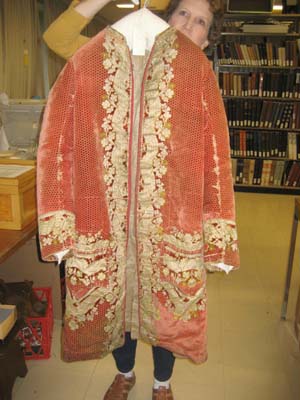
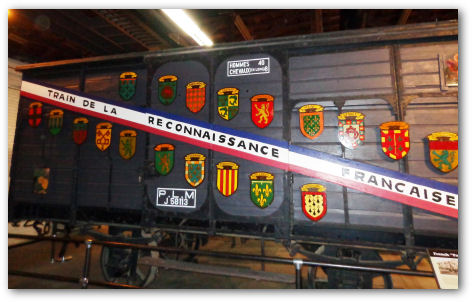
Photo courtesy of David J. Knutson Grand Chef de Gare Grande Voiture du Texas Austin, Texas
Location:
Texas Military Forces Museum
Camp Mabry
2200 West 35th Street
Austin, TX 78703
PO Box 5218
Austin, TX 78763
Hours of operation:
Tues-Sun – 10:00 AM-4:00 PM
Closed Monday
Contact:
David J. Knutson
Grand Chef de Gare
Grand Voiture du Texas
Phone: (512) 736-2377
Camp Mabry, Austin, Texas
Milestone Marker “Voie de la Liberté” (Liberty Road) offered to the State of Texas by the Town of Sainte-Ménehould (Marne) located about 45km from Verdun, France. A basic translation of the above inscription says “In Testimony of Recognition.” « En témoignage de Reconnaissance ». This monument of gratitude was one of the Merci gifts in the Texas boxcar and still sits beside the boxcar today at Camp Mabry, Austin, Texas. Photo taken by William D. Wray. http://mercitrain.org/Texas/More About Grande Voiture du Texas
During the First World War, French boxcars carried American Doughboys to the front. These wartime boxcars, which held either 40 men or 8 horses, were emblazoned with a “40/8”; a symbol readily understood by American veterans of that era.
https://www.facebook.com/events/151642671907090/
History of the Forty and Eight
Click Here for More Information
from Voiture Nationale
The Forty & Eight
OUR 1920 FOUNDERS WERE VETERANS OF W.W.I. FRANCE
Our organization’s formal title is La Societe des Quarente Hommes et Huit Chevaux; or the Society of Forty Men and Eight Horses. We are most commonly known as “La Societe” or simply “The Forty & Eight”.
The Forty & Eight is an independent, by invitation, honor organization of male and female U. S. veterans, more commonly known as the Forty & Eight.
The Forty & Eight is committed to charitable and patriotic aims. Our purpose is to uphold and defend the United States Constitution, to promote the well-being of veterans and their widows and orphans, and to actively participate in selected charitable endeavors, which include programs that promote child welfare and nurse’s training.
The titles and symbols of the Forty & Eight reflect its First World War origins. Americans were transported to the battle front on French trains within boxcars stenciled with a “40/8”, denoting its capacity to hold either forty men or eight horses. This uncomfortable mode of transportation was familiar to all who fought in the trenches; a common small misery among American soldiers who thereafter found “40/8” a lighthearted symbol of the deeper service, sacrifice and unspoken horrors of war that bind all who have borne the battle.
The Forty & Eight was founded in 1920 by American veterans returning from France. Originally an arm of The American Legion, the Forty & Eight became an independent and separately incorporated veteran’s organization in 1960. Membership is by invitation of honorably discharged veterans and honorably serving members of the United States Armed Forces.
https://www.texasboxcar.org/about-the-40—8.html
https://www.francaisdeletranger.org/blog/mdfdeusa-lady-in-liberty-visite-historique-du-comte-gilbert-de-pusy-la-fayette-a-leiny-mdfdejesuisladyliberty130-nps100/
